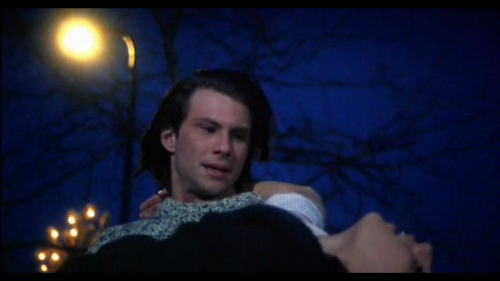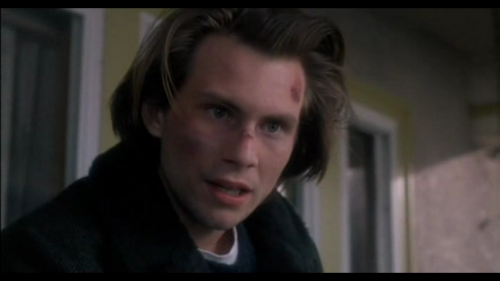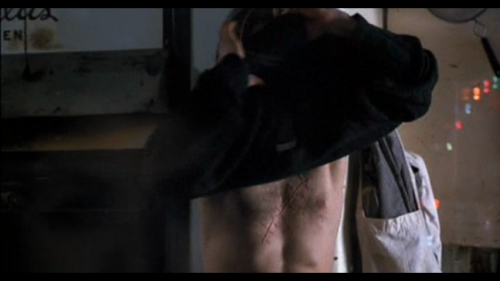Check out all of the posts for Male Feminists and Allies Theme Week here.
Tarantino has created dynamic and interesting female characters throughout his cinematic career, celebrating their strengths, personalities, and never presenting gender as an obstacle—instead, being a woman in his stories is often an advantage.
“A Bit Of An Evolution”: On Louis C.K. by Max Thornton
It’s exhausting to consume any media as a trans* person. It’s not really a matter of if I will become a punchline, but when. This goes triple or quadruple for comedy, and Louis C.K., for all his good qualities, is no exception.
Pacific Rim’s Raleigh Becket Is a Strong Female Character, and That’s Great by Deborah Pless
So, yes. Raleigh Becket is a Strong Female Character. Sure, he’s not female, but as far as our understanding of SFCs goes–which here means well-written female and feminine characters–he’s aces. Raleigh Becket is supportive, sweet, intuitive, and loving, and there is absolutely nothing wrong with that. Not a damn thing.
And in a society where male revelations about abuse, physical, emotional, or sexual, are still considered a mark of weakness, it’s fantastic that such a successful figure is willing to set an example. Especially when that person is Captain Jean Luc Picard, a super smart, sexy, sensitive, nerves-of-steel spaceship captain. I have a feminist daydream of Kirk (Shatner), Janeway (Mulgrew), Sisco (Brooks), and Picard (Stewart) doing a women’s rights PSA: I would make it my ringtone forever.
Adelle, Willow, Zoë, Natasha–you name her, Joss Whedon offers a multitude of heroines with a wide range of diverse identities. A topic as extensive as this, regarding a person with as much output as Joss Whedon’s, would serve to fill entire volumes.
Canadian-born Ryan Gosling is a talented actor, charismatic movie star and global sex symbol. The Notebook (2004) made Gosling a romantic screen icon but he has also, of course, given a number of inspired, thought-provoking performances in both independent and mainstream movies. His roles have been mostly varied and complex, but if you want a general sketch of his screen persona, I would say it’s a potent mix of melancholy, vulnerability, romanticism and sensuality. There is also an aggressive side. While they may retain a vulnerable aspect, he has played quite a few violent men. A seductive presence on the screen, Gosling is also an object of desire for multitudes of women around the world.
Vedder has spent his career fighting for a modern world that accepts and promotes women–he’s fought for reproductive rights, spoken out against sexual assault, and worked for worldwide safe pregnancy/childbirth.
Quote of the Day: Marlo Thomas on Male Allies
“… as we all know, in all movements, the only way to effect change is for everyone to be moving it forward.”
Caroline somehow knows that Adam is not a typical young man simply working for minimum wage at a local diner in Minnesota; he is a heavenly catalyst sent not to offer completeness in Caroline’s life, but to remind her that she is worth loving, even in his absence.
A Sunny South Korean Song for Sisterhood by Ben Cowburn
… Kang seems to be a strong advocate for feminism in film. Though South Korea cinema (and the country as a whole) clearly needs far more women in off-screen positions of power, Sunny seems like a small but hopeful step towards equality, and may well inspire girls in today’s high school cliques to one day demand those positions.
When you think about feminism in television, The OC and teen soaps in general are probably not the first example to come to mind. If you’re not familiar with The OC, it’s about a troubled youth named Ryan Atwood (Ben McKenzie) who is taken in by the Cohens, a very wealthy family, after his own family has abandoned him. I’m very passionate about The OC and it is much more than that, but I shall not digress (or at least try not to). The Cohens are comprised of Kirsten (Kelly Rowan), a wonderful mother as well as a successful architect and businesswoman, Seth (Adam Brody), the awkward and endearing pop-culture-referencing son, and Sandy (Peter Gallagher), a righteous public defender, father, and husband.
My first introduction to Matt Damon was the same as many movie viewers – Good Will Hunting, a film that he starred in and co-wrote with Ben Affleck. It was my favorite film of 1997 and still holds a special place in my heart for its humor, poignancy, and moving portrayal of the lasting effects of abuse.
So what’s feminist about it? Although the word “feminist” is never uttered, Michael plays Dorothy as a bold, liberated woman. At the audition, slimy director Ron Carlisle (Dabney Coleman) tells Dorothy she’s too “soft and genteel” and “not threatening enough” for the part. Dorothy replies: “Yes, I think I know what y’all really want. You want some gross caricature of a woman. To prove some idiotic point, like, like power makes women masculine, or masculine women are ugly… Well shame on the woman who lets you do that.” Right out of the gate, Dorothy not only speaks her mind, but also openly protests sexism.
“All men should be feminists. If men care about women’s rights the world will be a better place…
“We are better off when women are empowered – it leads to a better society.”


